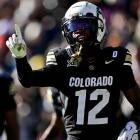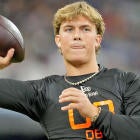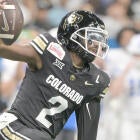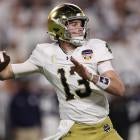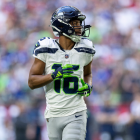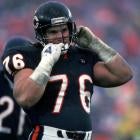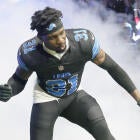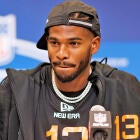
The NFL has announced the attendance numbers for Super Bowl LV, which will take place in Tampa in two weeks. The league is inviting approximately 7,500 vaccinated health care workers to Super Bowl LV as guests of the NFL in addition to the 14,500 additional fans in attendance at Raymond James Stadium. The majority of these health care workers - all will have received both doses of the vaccine - will come from hospitals and health care systems in the Tampa and central Florida area as each team will select vaccinated health care workers from their communities.
Peter O'Reilly, the NFL Executive Vice President of Club Business and League Events, spoke to CBSSports.com for an exclusive interview on the league's plans regarding Super Bowl LV and how the league plans to handle attendance for the 2021 season:
The NFL settled on an attendance of 22,000, slightly over 30% of the official capacity at Raymond James Stadium. What were the determining factors on that set number?
O'Reilly: "There were two pieces of that number. Obviously the 14,500 in paid attendance and then the 7,500 health care workers. The 14,500 was based on the protocol we established over the summer and what we watched and observed over the entirety of the season including at Raymond James Stadium with the Buccaneers, but also the 21 other stadiums that hosted fans.
"We focused on the core protocols around the game, the fans in pods separated around the stadium, the mandatory masks, and otherwise landed on that. And that was done in conjunction with public health officials, feedback from the CDC, local officials here in Tampa.
"What we announced today with the 7,500 health care workers was developed recently over the last month or so was in cooperation with the same medical experts. Once the first shots went into arms in December, we started to have a conservation regarding two things. Is there an opportunity to really thank and celebrate and bring a joy to vaccinated health care workers -- particularly those who were vaccinated and those we could invite -- and also use the Super Bowl platform to educate people about the vaccine. That 22,000 you mentioned, we worked through all those medical authorities and landed there."
What determined the seating pod arrangement? I believe the Dallas Cowboys were the first team to do that. Did you get intel from that organization?
O'Reilly: "We established that actually from some of our league-wide protocols from Dr. (Allen) Sills (NFL Chief Medical Officer) and our health experts shared with clubs in July and August. That was the protocol for all clubs this season which we're maintaining here throughout -- so really pods of two and four where you really don't have anybody in the seats next to you, in front of you or behind you. That's been league-wide protocol throughout the season."
Masks are obviously required, but will they be provided to the guests upon entry?
O'Reilly: "We're providing every fan whether vaccinated or non vaccinated and every staff member with a KN-95 mask -- which is a really effective mask -- and they will be required to be work during the game so that compliance is really, really important."
For the vaccinated health care workers attending the game, what day will they have to receive their two vaccine doses by?
O'Reilly: "January 24. So it's right upon us. The first shot of the Moderna/Pfizer vaccine by January 3 and the second by January 24, so you have that time period -- an extended period up until February 7 to ensure full vaccination. That was based on the advice from our medical experts."
Is there any specific area of the stadium they will be sitting in?
O'Reilly: "They will actually be dispersed around the stadium. That's based on our plans and getting the feedback from the CDC and others. If you're a non-vaccinated fan, you'll have three empty seats next to you on both sides and you'll have nobody in front of you or behind you. Those vaccinated health-care workers will be staggered in the rows behind spread out across the entirety of the stadium."
Will the tickets be paperback this year?
O'Reilly: "All mobile. This is the first Super Bowl where all the tickets will be mobile. That boat is clearly safer and we got a touch-less experience and the ability to communicate with fans is that much stronger as you lead up to the game and make sure they understand all the protocols by receiving push notifications and otherwise.
"That's been really embraced across the league this year and this will be the first all-mobile Super Bowl, all-cashless Super Bowl to avoid any kind of high touch experience at concessions and touched experiences in the bathroom. All of that has been accelerated which is a good thing for the long term and clearly the safest approach during the pandemic."
Does the NFL expect a full stadium capacity in time for the start of the 2021 season?
O'Reilly: "I think it's too far ahead to really speculate. As we head into the Super Bowl clearly is to highlight the importance of vaccinations and the health care workers were the first -- deservingly so -- in that. Hopefully as we head into the rest of winter and spring those vaccinations will continue and allow -- not just NFL fans and NFL games -- but people to be able to come together at such events."
Will being vaccinated be required to enter NFL stadiums going forward next year?
O'Reilly: "I think it's too early to really determine that. There's so much that we'll learn and we'll evolve this offseason heading into August. We'll heed the advice of our medical experts, but it's a bit early to formulate our plan. A lot of major events will take place between than from which we'll learn and continue to get smarter."
How has the city of Tampa handled the uncertainty of this game?
O'Reilly: "They've been incredible partners. I will say that. The city, the county. Our partners at the Tampa Super Bowl host committee -- this isn't the Super Bowl that they had in their minds when they were awarded the game -- but they have just been so incredible in just evolving with us and helping us bring it to life.
"Obviously a lot of things are not happening this year for obvious reasons but they have been with us every step of the way and specifically the vaccinated health care workers. They've been really great in working with the six hospitals across the Tampa Bay area. And I would say -- and this is always a part of Super Bowl weekend -- but they have been so involved in the community and focusing on the impact of the Super Bowl in the community. That piece of it and the legacy of this Super Bowl will leave has been just excellent in the partnership we had down here in Tampa."
Could the city be rewarded with a Super Bowl in the future due to the unfortunate timing of the pandemic?
O'Reilly: "Their focus -- and ours -- has clearly been February 7, what will be a special, unifying, and really positive Super Bowl. Any conservations -- especially any decision making at the ownership level -- will be had around Tampa and future Super Bowls. I'll just say they've been incredible partners and have risen to the occasion."
![[object Object] Logo](https://sportshub.cbsistatic.com/i/2020/04/22/e9ceb731-8b3f-4c60-98fe-090ab66a2997/screen-shot-2020-04-22-at-11-04-56-am.png)









